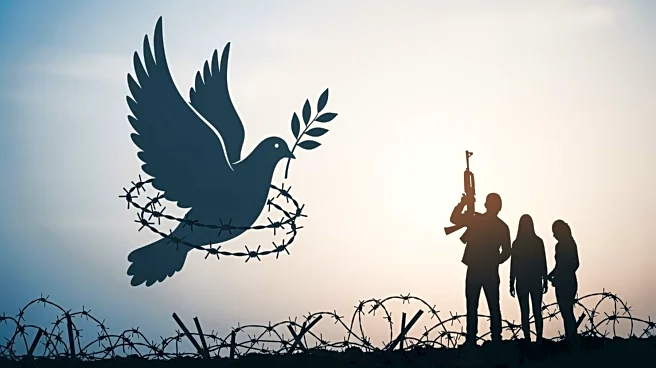What's Happening?
The Red Cross has received the remains of two more hostages from Hamas, which are to be transferred to Israeli forces in Gaza. This development comes amid a fragile truce that has paused the ongoing conflict
between Israel and Hamas. The Israeli military previously reported that one of the bodies handed over was not that of a hostage, adding to tensions surrounding the ceasefire. The Gaza Health Ministry has also received 45 bodies of Palestinians from Israel, bringing the total number of bodies returned to Gaza for burial to 90. The forensic team examining these remains noted signs of mistreatment. As part of the ceasefire agreement, Israel has been awaiting the return of the bodies of 28 hostages, while Hamas has handed over four bodies on Tuesday and four on Monday, following the release of 20 living hostages. In exchange, Israel freed around 2,000 Palestinian prisoners and detainees.
Why It's Important?
The transfer of hostages' remains and the fragile truce are significant as they highlight ongoing tensions and humanitarian concerns in the region. The ceasefire agreement, brokered by international parties, aims to reduce hostilities and facilitate humanitarian aid. However, the confusion over the identification of bodies and the signs of mistreatment underscore the challenges in achieving lasting peace. The return of hostages' bodies is crucial for closure for families and could impact future negotiations between Israel and Hamas. The humanitarian aspect is further emphasized by the World Food Program's efforts to deliver aid to Gaza, which had been paused due to the exchange and a Jewish holiday.
What's Next?
Israeli Prime Minister Benjamin Netanyahu has demanded that Hamas fulfill the ceasefire agreement regarding the return of hostages' bodies. The ceasefire plan introduced by President Trump called for all hostages to be handed over by a deadline that expired Monday. If not met, Hamas was to provide information about deceased hostages and return them as soon as possible. The ongoing exchange of bodies and the humanitarian aid deliveries are expected to continue, with international organizations monitoring the situation closely. The Red Cross and Hamas face challenges in recovering remains due to Gaza's destruction, and further exchanges are anticipated.
Beyond the Headlines
The situation raises ethical and legal questions about the treatment of hostages and prisoners during conflicts. The signs of mistreatment on returned bodies highlight potential human rights violations that could be investigated by international bodies. The ongoing conflict and ceasefire negotiations also reflect broader geopolitical dynamics in the Middle East, with implications for regional stability and international relations.









